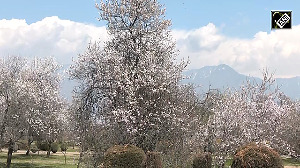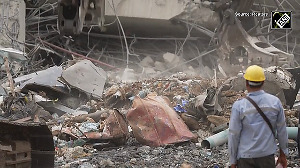
Kalpana did her schooling from Tagore Bal Niketan School, Karnal in 1976.
Kalpana got her Master of Science degree in aerospace engineering from University of Texas, 1984. In the same year she married Jean Pierre Harrison with who she shared a passion for nature, music, hiking, flying and Indian food.
In 1988 she acquired a Doctorate of Philosophy in aerospace engineering from University of Colorado. She also started work at NASA Ames Research Centre in the area of powered-lift computational fluid dynamics. Her research concentrated on simulation of complex air flows encountered around aircraft such as the Harrier in 'ground-effect'. Following completion of this project she supported research in mapping of flow solvers to parallel computers, and testing of these solvers by carrying out powered lift computations.
In 1993 Kalpana Chawla joined Overset Methods Inc, Los Altos, California, as vice-president and research scientist to form a team with other researchers specialising in simulation of moving multiple body problems. She was responsible for development and implementation of efficient techniques to perform aerodynamic optimisation.
She was selected by NASA in December 1994.
In March 1995 Kalpana reported to the Johnson Space Centre as an astronaut candidate in the 15th group of astronauts. After completing a year of training and evaluation, she was assigned as crew representative to work technical issues for the Astronaut Office EVA/Robotics and Computer Branches. Her assignments included work on development of Robotic Situational Awareness Displays and testing space shuttle control software in the Shuttle Avionics Integration Laboratory.
In November 1996 Kalpana Chawla was assigned as mission specialist and prime robotic arm operator on STS-87. STS-87 was the fourth US Microgravity Payload flight and focused on experiments designed to study how the weightless environment of space affects various physical processes, and on observations of the Sun's outer atmospheric layers.
In 1997 as part of her first mission, Kalpana travelled 6.5 million miles in 252 orbits of the Earth and logged 376 hours and 34 minutes in space.
In January 1998 Kalpana Chawla was assigned as crew representative for shuttle and station flight crew equipment. Subsequently, she was assigned as the lead for Astronaut Office's Crew Systems and Habitability section. She was then assigned to the crew of STS-107 scheduled for launch in 2003.
In January 2003 she flew in space on STS-107 Columbia on a 16-day flight in space.
On February 1 2003 space shuttle Columbia and her crew perished during entry, 16 minutes prior to scheduled landing.






 © 2025
© 2025